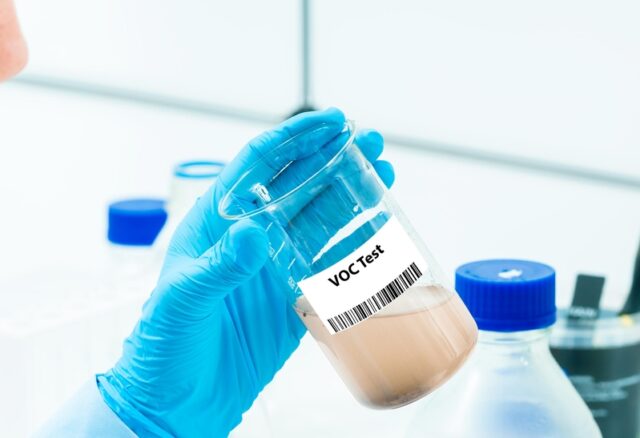
Keeping spaces healthy is a top concern for many people nowadays. An essential part of ensuring good indoor air quality is knowing about volatile organic compounds (VOCs) and how to detect them. The detection of VOCs is crucial for safeguarding the health and well-being of individuals and communities. Exploring the characteristics of VOCs and understanding why their detection is important reveals how they affect our lives.
Delving into the world of Volatile Organic Compounds
Volatile organic compounds are a mix of chemicals that get released into the air from a variety of sources, like household items and industrial activities such as paints and fuels, among others. Some VOC types can give off smells, while others don’t smell, making it hard to know they’re there without the right tools. Exposure to VOC for extended periods could result in health problems like headaches, breathing difficulties, and potential harm to organs like the liver and kidneys.
Ways to Detect VOCs
Different techniques are available for VOC detection, each with its own strengths and benefits. For example, Gas chromatography examines chemical compounds to give results. Photoionization detectors (PID) use light to ionize VOCs and measure their levels. Flame ionization detection (FID) burns the compounds to assess their concentration. These methods help in measuring VOC levels in settings.
The Significance of Identifying Volatile Organic Compounds
The importance of detecting volatile organic compounds (VOCs) should not be underestimated. Recognizing and tracking these substances can avert health impacts and support the creation of healthier living environments. VOC detection aids industries in complying with safety standards and safeguarding workers by upholding air quality standards. Moreover, early identification allows for intervention, minimizing risks to both people and the surroundings.
Applications of VOC Detection
Different sectors experience advantages, from the detection of volatile organic compounds (VOC) showcasing their significance in various fields of work. For instance, in the construction industry, VOC-level monitoring of construction materials is crucial for ensuring space. Tracking methods are used in the sector to uphold air quality in manufacturing facilities and safeguard workers and customers. Likewise, in the healthcare sector, VOC detection plays a role in maintaining safe environments within hospital settings and laboratories.
The Impact of Technology on Detection of Volatile Organic Compounds
Technological advancements have greatly improved the detection of VOCs (volatile organic compounds), making it easier and more effective to detect them now than before. Portable devices for detecting VOCs allow people to monitor air quality in time and come with user interfaces that offer essential information about indoor settings that are quickly accessible. With the progress in technology development, VOC detection has become more precise over time, allowing for measures to enhance safety in living spaces.
Minimizing the Release of Compound (VOC) Emissions
Detection is important in addressing the issue of VOC emissions. However, it is equally vital to focus on reducing these emissions. Using products and sustainable methods can help limit the release of VOCs into the air. Promoting the adoption of options by businesses can contribute to creating an environment for all. When detection measures are coupled with strategies to reduce emissions, communities can strive to improve air quality and overall health and wellness.
The Prospect of Detecting VOCs in the Future
As people become more conscious of air quality issues, the need for reliable VOC detection solutions emerges, and this is expected to rise in the coming years. Progress in this area is set to bring about more sophisticated technologies that promise levels of precision and effectiveness. Partnerships between researchers and businesses are poised to push the creation of detection techniques that aim to tackle changing environmental concerns. The forthcoming advancements in VOC detection will have the ability to transform how individuals view and engage with spaces.
Knowing about volatile organic compounds (VOCs) and how to detect them is crucial for ensuring healthier indoor environments. By using detection techniques, people and businesses can protect against health hazards and support environmental sustainability efforts.
As technology progresses and awareness increases, the detection of VOCs will become increasingly important in influencing the quality of air over time. Embracing these advancements helps create a healthier world for both current and future generations.
Disclaimer
Artificial Intelligence Disclosure & Legal Disclaimer
AI Content Policy.
To provide our readers with timely and comprehensive coverage, South Florida Reporter uses artificial intelligence (AI) to assist in producing certain articles and visual content.
Articles: AI may be used to assist in research, structural drafting, or data analysis. All AI-assisted text is reviewed and edited by our team to ensure accuracy and adherence to our editorial standards.
Images: Any imagery generated or significantly altered by AI is clearly marked with a disclaimer or watermark to distinguish it from traditional photography or editorial illustrations.
General Disclaimer
The information contained in South Florida Reporter is for general information purposes only.
South Florida Reporter assumes no responsibility for errors or omissions in the contents of the Service. In no event shall South Florida Reporter be liable for any special, direct, indirect, consequential, or incidental damages or any damages whatsoever, whether in an action of contract, negligence or other tort, arising out of or in connection with the use of the Service or the contents of the Service.
The Company reserves the right to make additions, deletions, or modifications to the contents of the Service at any time without prior notice. The Company does not warrant that the Service is free of viruses or other harmful components.












